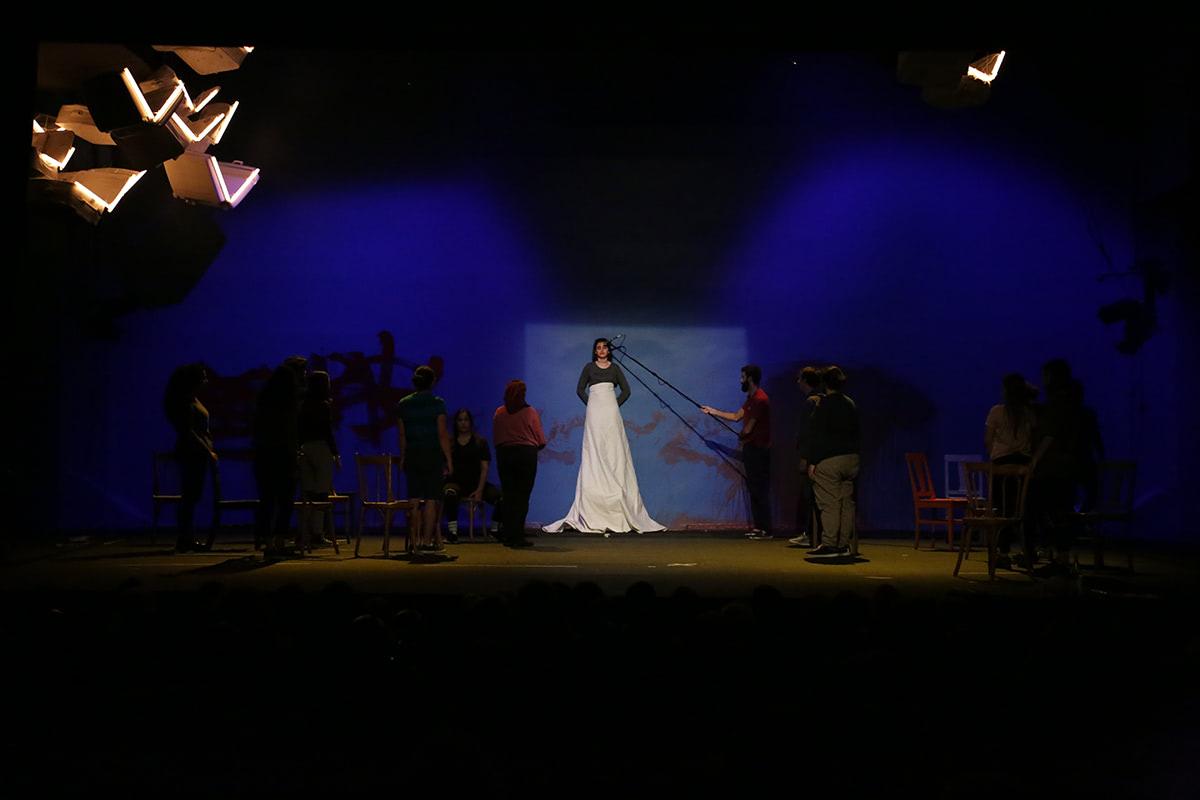Major Theater Production: LAU Students to Perform in New York
Amrika, directed by Dr. Lina Abyad, is part of a collaboration with the NYU Tisch School of the Arts.
In a unique learning experience, five LAU performing arts students travelled to New York with Associate Professor of Theater Lina Abyad to take part in the Festival of Voices, organized by the NYU Tisch School of the Arts.
The students will be performing in Dr. Abyad’s theater production Amrika at the festival curated by Arts Professor Catherine Coray. The event features productions by Arab and Arab-American playwrights performed by undergraduate students.
During their six-week stay in New York, students Nare Kurkjian, Aya Layl Tarabey, Jennifer Yammine, Dona Atallah, and Sally Jaber, worked with five other students from the NYU Tisch School of the Arts on the script.
Amrika retraces the journey of three Lebanese and Syrian women who migrated to the United States in the late 19th century, paying homage to the many unknown women who struggled to build a better life for themselves and their families.
Dr. Abyad had previously tackled the theme of migration in her 2018 heartbreaking adaptation of renowned author Emily Nasrallah’s Birds of September, but this time she has ventured to the other side of the story: What happened after they left?
“The stories we want to tell in this play concern specifically the women who left for the the US – widows, ambitious young women, desperate wives, or newlyweds leaving with their spouses. Some women were brave enough to leave alone, some left with their children or a member of the family,” Dr. Abyad said.
In addition to their acting roles, students are involved in reshaping and rewriting the scenes, which are based on documentation and stories collected by researchers about the first wave of immigration.
“These stories will then be used as the base for improvisation that I will conduct with my students/actors,” Dr. Abyad said.
The improvised scenes will be filmed and transcribed, before being written into the final script.
“The role of the students and their input will be crucial in this phase. We will work closely with the dramaturg – Professor Edward Ziter – who will guide us in the development of this piece.”
The play brings to life author Afifa Karam, Marie Azeez El-Khoury, and Hanna Kasbani Kourani.
Karam, in the early 20th century, denounced child marriage, domestic rape, domestic violence, and the patriarchy in her articles and books. She authored three novels – the first at the age of 23 – which are considered among the earliest works of Arab fiction.
The play will also encounter Marie Azeez El-Khoury who inherited a jewelry shop from her father which she named The Little Shop of T Azeez – the T standing for Tannous, her father’s name.
El-Khoury, who established herself as a leading jewelry designer and entrepreneur, and opened her shop on 5th Avenue, NY, facing Tiffany, was also a member of the Board of Trustees at the Metropolitan Museum of Art.
The third woman, Hanna Kasbani Kourani, was invited to Chicago as the Syrian women’s representative for the World’s Congress of Representative Women in 1894. There, Kourani became close friends with May Wright Sewall, one of the symbols of women’s liberation. This friendship shaped her views on the role of women in society.
The play will also reenact the journey of several women from their villages through the port of Beirut or Tripoli to a European port, and their arrival at Ellis Island in New York.
“These stations were never simple and each one was painful, complicated, and full of misadventure,” explained Dr. Abyad. “And then came the big test: the medical examination at Ellis Island, after which they were maybe granted entry to what most of them thought of as paradise. The question is: What is paradise?”
Once in the US, these women worked in restaurants or factories, as seamstresses, as servants for rich immigrants, or in family stores, but most of them went for peddling to support their impoverished families.
“We will follow their struggle in their new life, their bitter discovery that there wasn’t so much gold to shovel off the street of Nebraska, Cleveland, New York, or Toledo. But there was a life to build in this new land,” said Dr. Abyad.
Amrika premieres on April 21 and will run until April 30. Tickets can be bought here.
